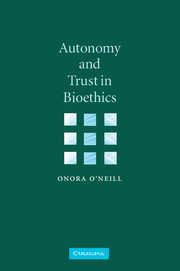Book contents
- Frontmatter
- Contents
- Preface
- Frontispiece
- 1 Gaining autonomy and losing trust?
- 2 Autonomy, individuality and consent
- 3 ‘Reproductive autonomy’ and new technologies
- 4 Principled autonomy
- 5 Principled autonomy and genetic technologies
- 6 The quest for trustworthiness
- 7 Trust and the limits of consent
- 8 Trust and communication: the media and bioethics
- Bibliography
- Institutional bibliography
- Index
1 - Gaining autonomy and losing trust?
Published online by Cambridge University Press: 06 November 2009
- Frontmatter
- Contents
- Preface
- Frontispiece
- 1 Gaining autonomy and losing trust?
- 2 Autonomy, individuality and consent
- 3 ‘Reproductive autonomy’ and new technologies
- 4 Principled autonomy
- 5 Principled autonomy and genetic technologies
- 6 The quest for trustworthiness
- 7 Trust and the limits of consent
- 8 Trust and communication: the media and bioethics
- Bibliography
- Institutional bibliography
- Index
Summary
CONTEMPORARY BIOETHICS
Bioethics is not a discipline, nor even a new discipline; I doubt whether it will ever be a discipline. It has become a meeting ground for a number of disciplines, discourses and organisations concerned with ethical, legal and social questions raised by advances in medicine, science and biotechnology. The protagonists who debate and dispute on this ground include patients and environmentalists, scientists and journalists, politicians and campaigners and representatives of an array of civic and business interests, professions and academic disciplines. Much of the debate is new and contentious in content and flavour; some of it is alarming and some misleading.
The first occasion on which I can remember a discussion of bioethics – we did not then use the word, although it had been coined – was in the mid-1970s at a meeting of philosophers, scientists and doctors in New York City. We were discussing genetically modified (GM) organisms: a topic of breathtaking novelty that was already hitting the headlines. Towards the end of the evening an elderly doctor remarked, with mild nostalgia, that when he had studied medical ethics as a student, things had been easier: the curriculum had covered referrals, confidentiality – and billing. Those simpler days are now very remote.
During these years no themes have become more central in large parts of bioethics, and especially in medical ethics, than the importance of respecting individual rights and individual autonomy.
- Type
- Chapter
- Information
- Autonomy and Trust in Bioethics , pp. 1 - 27Publisher: Cambridge University PressPrint publication year: 2002
- 1
- Cited by



